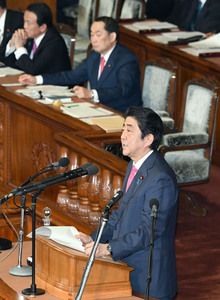Loading
Search
▼ Abe Brushes Off Fears of Threats to Civil Rights by Conspiracy Bill
- Category:Event
TOKYO — Prime Minister Shinzo Abe on Thursday dismissed opposition parties’ concerns that a contentious bill that would punish the planning of certain crimes, ostensibly as a counterterrorism measure, could threaten civil rights.
“It is completely unnecessary to be concerned that (the bill will lead to) investigative bodies watching the public’s movements,” he said during the first day of formal debate on the bill in the House of Representatives.
The government says the bill revamps three previous “conspiracy bills” that flopped amid concerns they could lead to human rights abuses including the arbitrary persecution of civic groups.
The ruling coalition of the Liberal Democratic Party and its junior partner Komeito are aiming to get the bill through the lower house by the end of this month so it can be enacted into law during the current Diet session, set to end in June.
But opposition parties argue the updated version of the bill remains dangerous and have vowed to fight it tooth and nail.
Abe said in Thursday’s Diet session that the new bill is “a plan that can dispel the worries and concerns that have previously been indicated, by making it clearer that ordinary people won’t be subject to punishment.”
“In the lead-up to the Tokyo Olympics and Paralympics, it’s the duty of the host country to expend every effort in tackling terrorism,” he said.
Justice Minister Katsutoshi Kaneda said the necessary legislation is being introduced “in light of the internationalization and organization of crime in recent years.”
Opposition lawmakers are planning to hone in on Kaneda in forthcoming deliberations. They have been asking him to explain the bill for some time, and each time he has answered that he will explain once the bill is compiled.
The charge of conspiracy has been reworded as “planning terrorism and similar acts” in the latest bill, which would amend the law on organized crime.
The bill restricts the application of the planning charge to “organized criminal groups,” whereas previous scrapped versions applied to the broader “groups.”
The proposed charge would apply to groups of two or more people found to have planned one of the 277 listed offenses, with at least one of them having made specific preparations such as procuring supplies or funds or checking out a location.
The government says the move is necessary to protect the 2020 Olympics and Paralympics in Tokyo from terrorism, and has stressed that the punishments it would introduce would not be applicable to “ordinary citizens.”
But government officials have also said civic groups that initially carry out activities with no criminal element could subsequently fall foul of the proposed law if they undergo a transformation in character.
Opponents argue the surveillance required to detect such a change would in itself compromise human rights.
The main opposition Democratic Party and three smaller allied parties argue the tweaks to the updated bill are not sufficient to dispel concerns that it could grant investigative bodies arbitrary search powers.
The opponents also say the list of 277 applicable offenses is too extensive. It was pared down from an initial list of 676 crimes following pressure from within the ruling coalition.
The bill was brought to a plenary session of the lower house after the chairman of its steering committee, a lawmaker with Prime Minister Shinzo Abe’s LDP, exercised his discretion to set the debate schedule.
The Democratic Party held the first meeting of its own taskforce on the bill on Thursday morning. The party’s Diet affairs chief, Kazunori Yamanoi, said it “must raise a great national uproar” over the bill.
Democratic Party leader Renho questioned in a party meeting on Thursday why the ruling parties have prioritized passing the conspiracy bill over a bill to toughen penalties for sex offenses.
© KYODO
- April 7, 2017
- Comment (0)
- Trackback(0)


